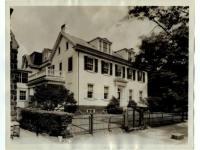Answer: 1683
Germantown, Philadelphia was founded in 1683, when Francis Daniel Pastorius (1651- about 1720) bought land in Pennsylvania on behalf of the members of the Frankfort Company, a group of individuals who came together to purchase land in William Penn's new province. The Frankfort Company provided him with a letter of attorney, giving him power to oversee the lands on behalf of the company members. This initial contract was signed by Jacobus van de Walle (for himself and his wife, but also as attorney for Johann Wilhelm Peterson and his wife, Eleonore von Merlau Peterson), Daniel Behaghel, Johann Jacob Schütz, Caspar Merian, and Pastorius himself.
Pastorius came to Pennsylvania in 1683 and began the challenging task of overseeing a fledgling colony that lacked both the goods and skills to develop quickly. In November, 1685 he wrote to the company members and asked to be released from his responsibilities. This resulted in a reorganizing of the Frankfort Company, but not the release from service that Pastorius asked for. He would remain their agent until 1700, when he was replaced as principal agent for the company by three new men: Daniel Falkner, Johannes Kelpius, and Johannes Jawert.
Outside of his professional responsibilities, Pastorius wrote constantly. His writings included the first protest against slavery written in the United States (1688), a Detailed Geographical Description of Pennsylvania (1700), the Young Country-Clerks Collection of legal document templates and examples, an English language primmer, letters, poetry, religious documents, guides on farming and beekeeping, and tracts on various subjects. He also wrote about more personal matters. He penned an account of his life in Germany and journey to Pennsylvania, and compiled bits of knowledge in his Bee-Hive, a collection of advice, information, and wisdom intended for his sons.
Researchers can access two collections related to Francis Daniel Pastorius: his papers (#574) and his records (Am. 3714), both of which relate to the history of Germantown. We also have a sizeable selection of books on the history of Germantown in our library.

